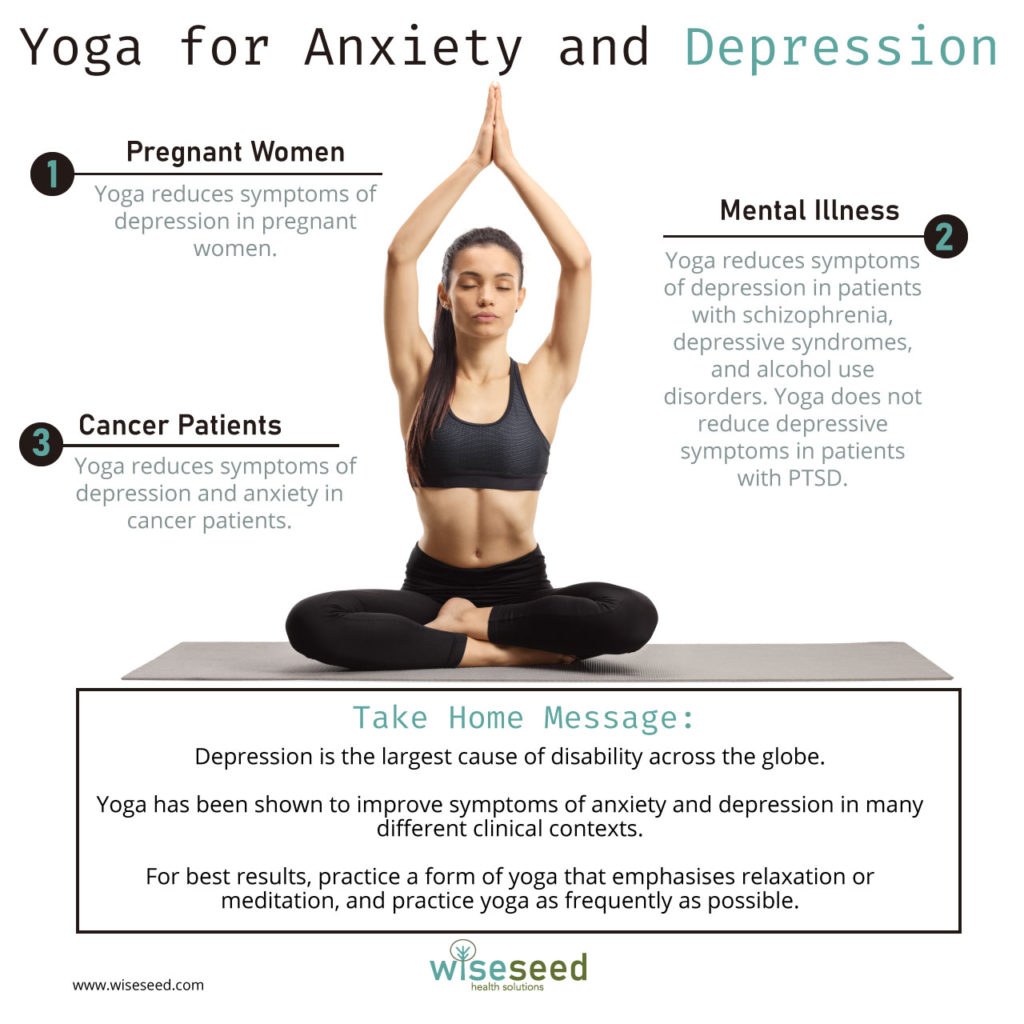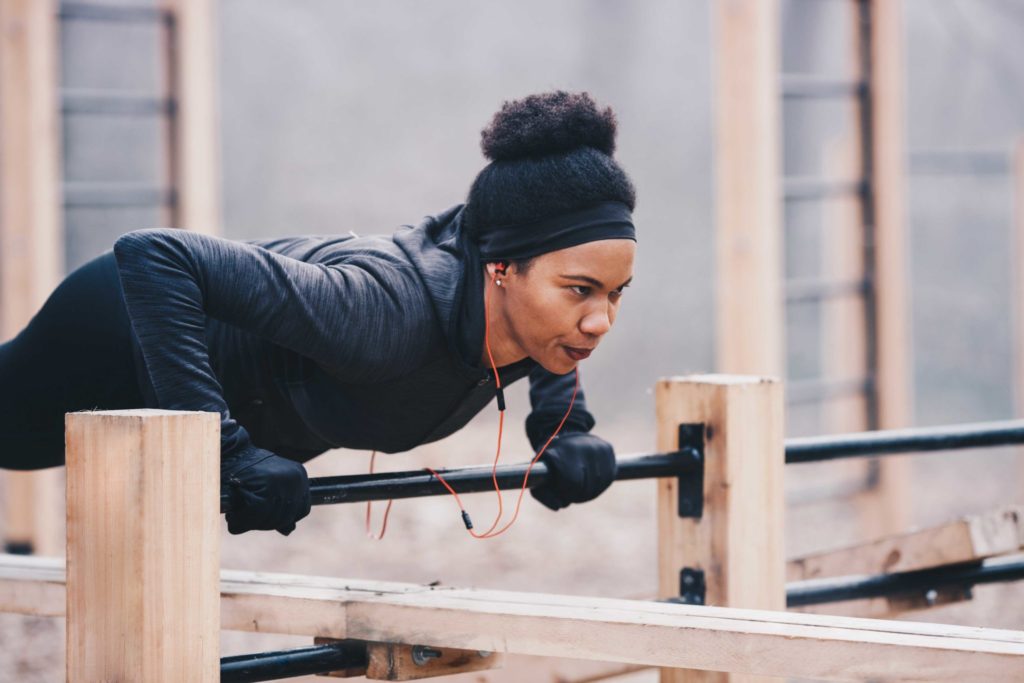Yoga for Reducing Depression and Anxiety

“That’s the thing about depression: A human being can survive almost anything, as long as she sees the end in sight. But depression is so insidious, and it compounds daily, that it’s impossible to ever see the end.”
Elizabeth Wurtzel, Prozac Nation
Arguably one of the greatest impediments to human flourishing is depression. Depression, the feeling of ongoing sadness and loss of interest in life, remains the leading cause of disability worldwide (1). Therefore, we are committed to doing everything that we can to help reduce the effect of depression in people’s lives.
On this front, we have some exciting news! Research performed over the past several years has shown that yoga practice can help you reduce symptoms of depression and anxiety.
Yoga practice can help you help fight depression and anxiety.
For most of us, depression is an unwelcome yet inevitable part of life. If we are lucky, we briefly visit the land of gloom and swiftly return to normal. For others, depression is a constant and unwelcome companion. Fortunately, yoga is emerging as an effective method for reducing the symptoms of anxiety and depression in a range of clinical settings.
1. Yoga for treating depression during pregnancy.
As many as one in five women experience depression during pregnancy (2)! This is particularly concerning because experiencing depression during pregnancy can be damaging to both mother and child. For example, the children of depressed mothers are at greater risk of developing more behavior problems during childhood and adolescence than children of non-depressed mothers (2).
Although the danger of depression during therapy is well recognized, treating depression during pregnancy risks damaging the unborn child (2). Obviously, this makes treating depression in pregnant women very tricky indeed.
Gong and colleagues analyzed the data from six clinical trials that tested the effectiveness of yoga to treat depression in pregnant women (2). Strikingly, they found that yoga practice significantly reduced symptoms of depression in both depressed and non-depressed pregnant women (2).
These findings are important for two reasons.
First, they reveal yoga as an effective intervention to reduce symptoms of depression in pregnant women that is safe for both mother and child.
Second, the ability of yoga to reduce symptoms of depression in non-depressed women suggests that yoga may i) help prevent the onset of depression; and ii) help keep people in remission after they have responded to conventional therapy.
2. Yoga for treating depression in mental illness.
Depressive disorders are the most common form of mental illness (3). In addition, depression is a common symptom in other forms of other mental illnesses such as anxiety, schizophrenia, and PTSD (3). Brinsley and Colleagues, therefore, determined whether yoga can be used to treat depression in people suffering from a variety of mental illnesses (3).
After analyzing the data from 13 clinical trials, they found that yoga is highly effective in treating depression associated with schizophrenia, moderately effective at reducing depression in people suffering from depressive disorders, and somewhat effective at reducing depression in people with alcohol abuse disorders (3). Disappointingly, yoga was ineffective at reducing symptoms of depression in people suffering from PTSD (3).
Collectively, these results suggest that yoga may be an effective strategy at reducing symptoms of depression in some, but not all, mental disorders.
3. Yoga for treating depression and anxiety in cancer patients.
Being diagnosed with cancer and enduring cancer therapy is tremendously traumatic. As a result, many cancer patients experience significant anxiety and depression both during and after cancer therapy.
Fortunately, an analysis of 16 clinical trials showed that practicing yoga has a moderate effect on reducing symptoms of depression and anxiety in cancer patients (4).
Importantly, the studies to date indicate that yoga is safe for cancer patients, with only minor strains reported as a side effect in patients starting yoga practice (4).
What is the best way to practice yoga to reduce depression and anxiety?
The studies performed to date provide two important insights into how to best practice yoga if your goal is to reduce stress and anxiety.
1. Practice forms of yoga that include relaxation and/or meditative practice.
Yoga disciplines that routinely incorporate relaxation and/or meditation within their practice are much better at reducing symptoms of depression than yoga disciplines focused exclusively on physical performance (2).
Thus, for reducing symptoms of depression and anxiety, we recommend that you participate in a yoga style that has a heavy emphasis on relaxation/meditation.
2. Practice Yoga Regularly
Practicing yoga more frequently has a bigger impact on reducing depression than infrequent practice (3). In contrast, the duration of each session had no observable effect on the outcome (3).
Bottom line, we recommend that you hit the yoga mat several times a week for best results.
Should I ditch my anti-depression/anti-anxiety medication and take up yoga?
Hell no!
In most cases, yoga has a moderate effect on reducing symptoms of depression and anxiety.
Thus, yoga is unlikely to work as a stand-alone treatment if you are suffering from clinical anxiety or depression. At this stage, we recommend that you treat yoga as a useful addition to your current therapy. The golden rule is to talk to your physician and always follow their advice.
Take Home Message
Depression remains the largest cause of disability in the world (1). We are therefore extremely excited by recent breakthroughs in treating depression, such as the use of psilocybin and yoga. While psilocybin therapy is still some way off becoming a mainstream therapy for depression and anxiety, yoga is readily available, safe, and effective at reducing symptoms of anxiety and depression.
Perhaps the most exciting part of the story is that that yoga can prevent the onset of depression and anxiety in the first place! Further, yoga may help keep depressed and anxious patients in remission once their conventional therapy has worked.
For these reasons, we believe that practicing yoga increases your resilience and maximizes your ability to flourish.
To download the free PDF of this article, please click on the link below.

Acknowledgements
Images provided by Ljupco and monkeybusinessimages
Some Useful Links for People Experiencing Depression and Anxiety
https://www.beyondblue.org.au/
https://www.mhanational.org/depression-support-and-advocacy
References and Further Reading
1. D. Vigo, G. Thornicroft, R. Atun, Estimating the true global burden of mental illness. Lancet Psychiatry 3, 171-178 (2016).
2. H. Gong, C. Ni, X. Shen, T. Wu, C. Jiang, Yoga for prenatal depression: a systematic review and meta-analysis. BMC Psychiatry 15, 14 (2015).
3. J. Brinsley et al., Effects of yoga on depressive symptoms in people with mental disorders: a systematic review and meta-analysis. Br J Sports Med, (2020).
4. M. Gonzalez et al., Yoga for depression and anxiety symptoms in people with cancer: A systematic review and meta-analysis. Psychooncology, (2021).
Disclaimer
The material displayed on this website is provided without any guarantees, conditions or warranties as to its accuracy.
Information written and expressed on this website is for education purposes and interest only. It is not intended to replace advice from your medical or healthcare professional.
You are encouraged to make your own health care choices based on your own research and in conjunction with your qualified practitioner.
The information provided on this website is not intended to provide a diagnosis, treatment or cure for any diseases. You should seek medical attention before undertaking any diet, exercise, other health program or other procedure described on this website.
To the fullest extent permitted by law we hereby expressly exclude all warranties and other terms which might otherwise be implied by statute, common law or the law of equity and must not be liable for any damages whatsoever, including but without limitation to any direct, indirect, special, consequential, punitive or incidental damages, or damages for loss of use, profits, data or other intangibles, damage to goodwill or reputation, injury or death, or the cost of procurement of substitute goods and services, arising out of or related to the use, inability to use, performance or failures of this website or any linked sites and any materials or information posted on those sites, irrespective of whether such damages were foreseeable or arise in contract, tort, equity, restitution, by statute, at common law or otherwise.

Ten Minutes is All You Need
Research has shown that ten minutes of moderate-to-vigorous exercise performed each day is enough to significantly reduce your risk of early death.

Dogs Make Kids More Resilient
New research demonstrates the positive role dogs have on the social and emotional development of children aged 2-5 years.




